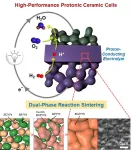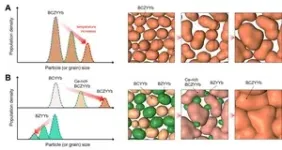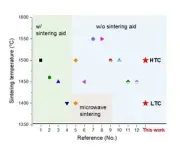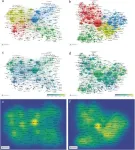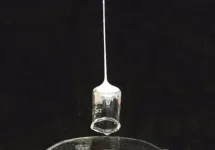(Press-News.org) Dr. Ho-Il Ji from the Hydrogen Energy Materials Research Center at the Korea Institute of Science and Technology (KIST, President Sang-Rok Oh), along with Professor Sihyuk Choi's team from Kumoh National Institute of Technology, announced that they have developed a new synthesis method that can significantly reduce the sintering temperature required for the densification process of the electrolyte in next-generation high-efficiency protonic ceramic cells.
Existing solid oxide cells (SOC) can produce electricity in fuel cell operation and hydrogen in electrolysis operation. Notably, they operate at high temperatures above 600°C, offering higher power conversion efficiency compared to other fuel cells. However, the downside is the high production cost due to the need for materials that can withstand high temperatures, as well as performance degradation over time due to thermal deterioration.
Recently, protonic ceramic cells (PCCs), which utilize proton (hydrogen ion) transport instead of oxygen ions, have emerged as a next-generation energy conversion devices such as fuel cells and electrolyzers. Unlike conventional oxygen ion-conducting electrolytes, PCCs transport the smaller hydrogen ions, enabling higher ionic conductivity. However, to produce the electrolyte for PCCs, sintering at temperatures above 1,500°C is required. During this process, component evaporation or precipitation occurs, degrading the electrolyte’s ion-conducting properties, which has been a major obstacle to the commercialization of PCCs.
To lower the sintering temperature, the research team developed a new process for synthesizing electrolyte materials. Typically, the electrolyte for proton ceramic cells is produced by sintering a powder composed of a single compound. However, when additives are used to lower the sintering temperature, residual additives can remain in the electrolyte, reducing the cell's power density. The research team discovered that, by synthesizing a powder containing two different compounds through low-temperature synthesis, a single compound with excellent sintering properties forms during the sintering process accompanying the reaction to single phase. This allows the sintering temperature to drop to 1,400°C without the need for additives.
The proton ceramic electrolyte synthesized through this new process forms a dense membrane even at lower temperatures, enhancing the electrochemical properties of the cell. When applied to actual proton ceramic cells, this electrolyte demonstrated superior proton conductance, achieving a power density of 950mW/cm² at 600°C—approximately double that of existing cells. This is expected to reduce process time and simultaneously improve thermal stability and the performance of ceramic electrolytes. The research team plans to apply this new process, which utilizes the accelerated sintering between the two compounds, to the production of large-area cells for the commercialization of proton ceramic cells.
Dr. Ji of KIST stated, "This research has resolved the chronic sintering issues in the production of proton ceramic cells. If large-area technology is successfully developed, it will enable efficient energy management through green hydrogen production via electrolysis and pink hydrogen production by utilizing waste heat from nuclear power plants."
###
KIST was established in 1966 as the first government-funded research institute in Korea. KIST now strives to solve national and social challenges and secure growth engines through leading and innovative research. For more information, please visit KIST’s website at https://eng.kist.re.kr/
This research was supported by the Ministry of Science and ICT (Minister Sang Im Yoo) through KIST's major project and the Future Hydrogen Fundamental Technology Development Project , as well as by the Ministry of Trade, Industry, and Energy (Minister Duk-Geun Ahn) through the Core Technology Development Project for New and Renewable Energy. The research results were published in the international journal Advanced Energy Materials (IF 24.4, JCR 2.6%).
END
Development of a new electrolyte synthesis method for next-generation fuel cells: a step closer to green hydrogen production
Development of a new synthesis method to drastically reduce the sintering temperature of proton ceramic electrolytes
2024-10-10
ELSE PRESS RELEASES FROM THIS DATE:
Rage clicks: Study shows how political outrage fuels social media engagement
2024-10-10
A new Tulane University study explains why politically charged content gets more engagement from those who disagree. Researchers found a “confrontation effect,” where people are more likely to interact with content that challenges their views than those that align with them.
The study analyzed data from Twitter, Facebook, and online experiments over time, including during the 2020 U.S. presidential election, and found that users frequently react to opposing viewpoints with heightened engagement, often ...
E-waste experts urge public: Stop trashing electronic products with ordinary garbage (International E-Waste Day)
2024-10-10
To mark the upcoming International E-Waste Day, Oct. 14, consumers worldwide are urged to collect dead and/or unused electronics and electrical products and give them a second life through reuse or repair, or recycle them properly.
Above all: stop tossing them out in household waste bins.
The Global E-waste Monitor 2024, authored by UNITAR in cooperation with ITU, reported almost a quarter of end-of-life electronic waste ends up in home trash, squandering billions of dollars worth of copper, gold and other precious metals, materials critical to the production of such products, along with valuable plastics, and glass.
The 14 million tonnes of ...
Hospitals that are understaffed for infection prevention and control have higher rates of infection, study says
2024-10-10
Hospitals that are Understaffed for Infection Prevention and Control Have Higher Rates of Infection, Study Says
Nearly 4 in 5 hospitals are not staffed at sufficient level to keep patients safe from preventable infections
Arlington, Va. — October 10, 2024 — Inadequate infection prevention and control staffing levels are associated with higher rates of healthcare-associated infections, according to a new study published today in the American Journal of Infection Control.
The study, conducted by the APIC Center for Research, Practice & Innovation, summarizes a pilot project to evaluate a new online calculator aimed at providing facility-specific recommendations ...
Study reveals 85% of women prefer choice between self-sampling and traditional cervical screening
2024-10-10
A new study led by researchers at Queen Mary University of London reveals women would welcome the option to choose between self-sampling and traditional screening done by a nurse or doctor for human papillomavirus (HPV)-based cervical screening.
The study, published in the Journal of Medical Screening, assessed a group of 2,300 women aged 24-65 who had collected their own samples alongside having their standard cervical screening in 38 GP practices across England. Participants were asked about their screening preference and their attitudes toward being offered a choice between ...
Global advances and future trends in cervical cancer research from 2013 to 2022
2024-10-10
With ongoing advancements in cervical cancer research, the global scientific community has gained a more comprehensive understanding of this significant threat to women's health. A research team led by Professor Weimin Kong has recently published a paper titled "Hotspots and frontiers in cervical cancer research: a bibliometric and visualization analysis from 2013 to 2022" in the internationally renowned journal Malignancy Spectrum. The study systematically analyzed the development trends and research hotspots in global cervical cancer research over the past decade using bibliometric methods.
The research ...
Inspired by Spider-Man, a lab recreates web-slinging technology
2024-10-10
Every kid who has read a comic book or watched a Spider-Man movie has tried to imagine what it would be like to shoot a web from their wrist, fly over streets, and pin down villains. Researchers at Tufts University took those imaginary scenes seriously and created the first web-slinging technology in which a fluid material can shoot from a needle, immediately solidify as a string, and adhere to and lift objects.
These sticky fibers, created at the Tufts University Silklab, come from silk moth cocoons, which are boiled in solution and broken down into their building block proteins called fibroin. ...
Applied Microbiology International’s 2024 Honorary Fellowship goes to Dr Chikwe Ihekweazu
2024-10-10
Applied Microbiology International (AMI) is delighted to announce that its 2024 Honorary Fellowship goes to Dr Chikwe Ihekweazu, who is Assistant Director General at the World Health Organization (WHO), leading the WHO Hub for Pandemic and Epidemic Intelligence.
AMI Honorary Fellowships are given to individuals who have made an outstanding contribution to or impact on the field of applied microbiology. Honorary Fellows of AMI are nominated and chosen each year by the organisation’s membership.
Chikwe ...
Pitt scientists validate new lab test platform for blood biomarkers of Alzheimer's disease
2024-10-10
University of Pittsburgh scientists independently validated a new blood test platform that can simultaneously measure more than a hundred biomarkers of Alzheimer's disease. The platform might improve clinicians’ ability to capture the multifaceted nature of Alzheimer’s pathology and streamline early disease diagnostics. The report was published in Molecular Neurodegeneration today.
“Alzheimer’s disease should not be looked at through one single lens,” said senior author Thomas Karikari, Ph.D., M.Sc., assistant professor of psychiatry at Pitt. “Capturing aspects of Alzheimer’s pathology in a panel of clinically validated biomarkers would increase ...
No bolts about it: New technology improves structural strength
2024-10-09
In a collaborative effort between Texas A&M University and Sandia National Laboratories, researchers have significantly improved a new joining technology, interlocking metasurfaces (ILMs), designed to increase the strength and stability of a structure in comparison to traditional techniques like bolts and adhesives, using shape memory alloys (SMAs). ILMs offer the potential to transform mechanical joint design in manufacturing for aerospace, robotics and biomedical devices.
“ILMs are poised to redefine joining technologies ...
Medical professionals must lead the fight against climate misinformation
2024-10-09
Medical professionals have a responsibility to lead the fight against climate misinformation to ensure that the public is well informed about the health risks posed by climate change, say experts in The BMJ today.
Misinformation (inaccurate information spread without malicious intent) and disinformation (deliberately deceptive information) in health is not new, write Professor Andy Haines and colleagues.
Just as the rapid spread of false information during the covid-19 pandemic undermined public trust in science and public health interventions, false information also pervades the climate change debate, influencing public perception and ...
LAST 30 PRESS RELEASES:
Kidney cancer study finds belzutifan plus pembrolizumab post-surgery helps patients at high risk for relapse stay cancer-free longer
Alkali cation effects in electrochemical carbon dioxide reduction
Test platforms for charging wireless cars now fit on a bench
$3 million NIH grant funds national study of Medicare Advantage’s benefit expansion into social supports
Amplified Sciences achieves CAP accreditation for cutting-edge diagnostic lab
Fred Hutch announces 12 recipients of the annual Harold M. Weintraub Graduate Student Award
Native forest litter helps rebuild soil life in post-mining landscapes
Mountain soils in arid regions may emit more greenhouse gas as climate shifts, new study finds
Pairing biochar with other soil amendments could unlock stronger gains in soil health
Why do we get a skip in our step when we’re happy? Thank dopamine
UC Irvine scientists uncover cellular mechanism behind muscle repair
Platform to map living brain noninvasively takes next big step
Stress-testing the Cascadia Subduction Zone reveals variability that could impact how earthquakes spread
We may be underestimating the true carbon cost of northern wildfires
Blood test predicts which bladder cancer patients may safely skip surgery
Kennesaw State's Vijay Anand honored as National Academy of Inventors Senior Member
Recovery from whaling reveals the role of age in Humpback reproduction
Can the canny tick help prevent disease like MS and cancer?
Newcomer children show lower rates of emergency department use for non‑urgent conditions, study finds
Cognitive and neuropsychiatric function in former American football players
From trash to climate tech: rubber gloves find new life as carbon capturers materials
A step towards needed treatments for hantaviruses in new molecular map
Boys are more motivated, while girls are more compassionate?
Study identifies opposing roles for IL6 and IL6R in long-term mortality
AI accurately spots medical disorder from privacy-conscious hand images
Transient Pauli blocking for broadband ultrafast optical switching
Political polarization can spur CO2 emissions, stymie climate action
Researchers develop new strategy for improving inverted perovskite solar cells
Yes! The role of YAP and CTGF as potential therapeutic targets for preventing severe liver disease
Pancreatic cancer may begin hiding from the immune system earlier than we thought
[Press-News.org] Development of a new electrolyte synthesis method for next-generation fuel cells: a step closer to green hydrogen productionDevelopment of a new synthesis method to drastically reduce the sintering temperature of proton ceramic electrolytes
